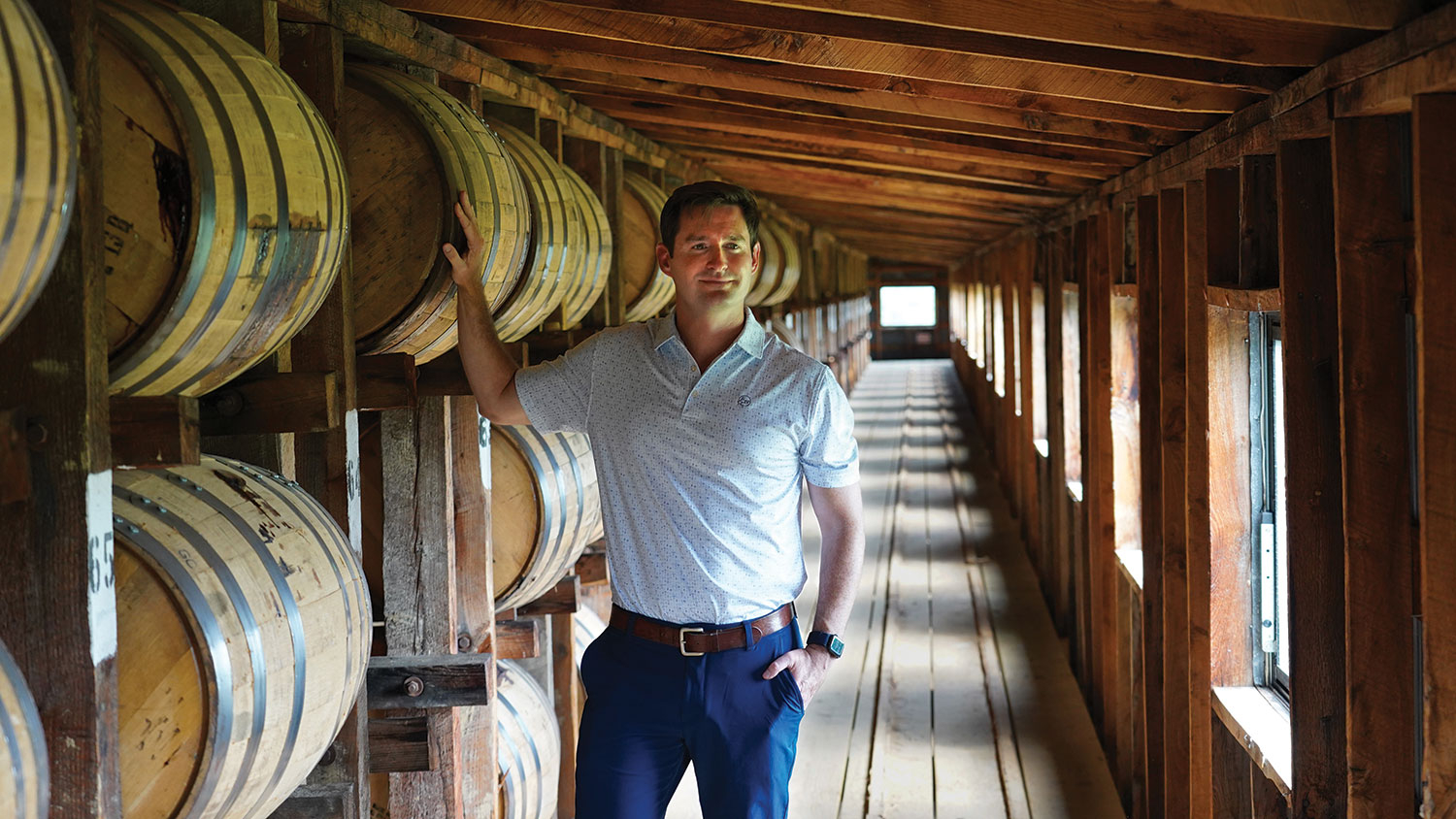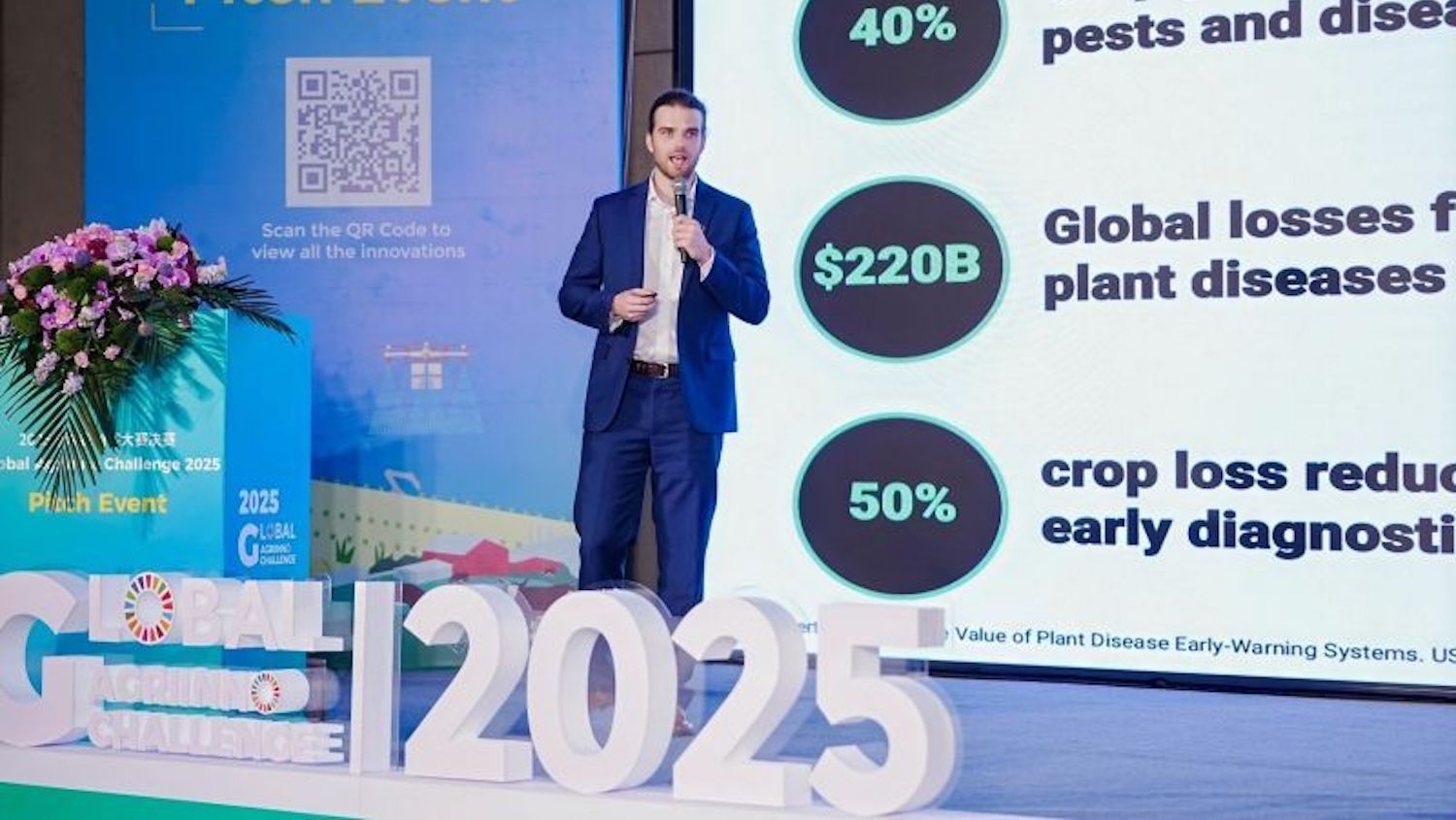In the business world, it’s a career goal to appear on a Forbes Magazine list of the 30 young leaders to watch in an industry.
Entrepreneur Connor Balfany, co-founder of The Leaf Protein Co., achieved that milestone just one year after earning his Ph.D. in food science at NC State University in 2024. Balfany appears on the Forbes 30 Under 30 Asia list for 2025.
Based in Melbourne, Australia, The Leaf Protein Co. has developed technologies to extract protein from leaf tissues, creating an edible powder that can be used in drinks or dietary supplements.
Balfany expressed his gratitude for the Forbes honor on LinkedIn, writing, “From the mentors and colleagues of my Ph.D., to the incredible team and supporters of The Leaf Protein Co., this recognition belongs to all of you, too.”
We asked Balfany to tell us about some of the mentors and milestones on his path to entrepreneurship.
When did you become interested in becoming an entrepreneur?
I have always had this lifelong love for business. A friend and I used to sell bags of chips on the playground in third grade. In high school, I started our business club, which is where I first heard about Forbes 30 Under 30. I never really thought it was something I would be eligible for, but to even be in consideration as a young entrepreneur was a really gratifying pat-on-the-back moment.
How were you nominated for the Forbes list?
It was quite serendipitous — I was actually contacted by an editor as Forbes was closing their application round. Typically you either nominate yourself or someone else. The lead editor of Forbes Asia — since this is an Australian-based company and that’s where we set up our manufacturing facilities — reached out to me saying, “Hey, we have a week and a half left of these applications. You’ve come across my desk for symposiums you’ve done in Asia. Can you submit an application?” We had done a project in Thailand, worked with Singapore universities and then Australia Ag Founder News had covered us a couple of times.
When did you find out that you had made the Forbes 30 Under 30 Asia list?
I was actually back in the USA, visiting my childhood home in Minnesota, working on an old BMW. I remember looking at my phone and just seeing an email notification saying, “Congratulations, you’ve been chosen to represent the Forbes 30 Under 30, 2025 class.”
It was the most surreal moment, a perfectly average afternoon seared into my memory. I was listening to Lynyrd Skynyrd’s “Simple Man,” which has since become a bit of an anthem. It was golden hour and my two dogs were right next to me. I was covered in grease, and all of a sudden with a glance at my screen, time stopped. I remember being shocked and running up to my mom, who was coming down with the lawnmower and yelling to her, “We did it! We did it!” She thought something had happened with the car before a brief clarification had her celebrating even more than me. And then I think a day later they published the actual article with everyone listed and blurbs about them.

What brought you from Minnesota to NC State?
It’s kind of a wild trajectory, but it started back in 2014 by connecting with a Cargill scientist named Corey E. Scott [an active director for the NC Agricultural & Life Science Research Foundation]. My mom actually met him in an airport and they sat next to each other on a plane and got to talking about occupations. He mentioned that he was a food scientist at Cargill in Minneapolis, and he was flying over to Amsterdam for a big project on polyphenols and antioxidants and blueberries. And she said, “My son’s about to enter college and study biological science. He wants to be a scientist. Could you guys connect?”
Over the next two to three years, Corey Scott became my sounding board as I entered college [at Gustavus Adolphus College] on what it meant to go get a Ph.D., to involve yourself in the scientific rigor of academics and companies. He was just an incredible mentor and supporter on my path to being a career scientist. Before this, it was so amorphous. You hear about being a scientist as a job, but it’s so hard to frame up without actual exposure to what that job is or talking to someone in that field.
How did your mentor help guide you?
It wasn’t until junior year of college that I really got my chance to be hands-on. And that was with NC State’ University’s Plant Pathways Elucidation Project or P2EP, which is hosted at the Plants for Human Health Institute (PHHI) in Kannapolis. Every student or group of students is given a research project that they have all summer to work on and present evidence on.
Corey Scott said, “You know what? We’ve been talking about being a scientist for three, four years. I think you should apply to this program. It’s competitive, but you’ve got some good fundamentals.” I was fortunate enough to be accepted, and that brought me to NC State and particularly to the PHHI, where I was staffed under Dr. Slavko Komarnytsky. It was such an incredible program. I remember being given so much autonomy, but also guidance in asking a question, defining the parameters, setting out how you want to solve this problem, designing the experiments to create supporting evidence and then communicating those results.
I was the only student who did an individual project out of I think the 55 of us there, and was able to get first place at the summer symposium. That project also started my work on plant protein extraction. I was looking at salt-tolerant species, extracting the protein for them and using them as caloric support for areas affected by resource scarcity and malnutrition. Being able to design research and answer questions, and seeing the relevant impact while given autonomous ability to design my own project, got me hooked on what it meant to be a hands-on researcher. What’s more, Dr. Komarnytsky and I had a really wonderful working relationship. Going into my final undergraduate year of college, I thought I’d be coming back to pursue a graduate degree with Dr. Komarnytsky, looking at plant protein extraction that had real-world impact and continuing what I so enjoyed in the three months of the P2EP program.
How did you become a co-founder?
My co-founder and I connected in the latter part of the first year of my Ph.D. I stumbled upon a company that had been formed, The Leaf Protein Co. And this was essentially just powderized high protein leaves; it wasn’t an extraction protocol. The company had been started by my now co-founder Fern [Ho] in Australia, and they had some momentum with having interest in high-protein leaf powders. When I connected with them, I said, “I’m doing my Ph.D. in the actual extraction of these proteins, keeping them functional, higher quality, more protein content, and all of those higher desirability aspects that maybe food science is leaning towards as well as all the nutritional aspects that formulators are looking for in products.”
It was just an incredible serendipitous synergy. Fern, my co-founder, has an MBA, was a past product manager at Apple, and was with the executive management team with Telstra, which is a telecommunication company in Australia. In short, she really had that business acumen where I had the scientific and research background. We found ourselves occupying two sides of the same coin of what it meant to deploy a research-focused nutrition-oriented idea
Can you share your elevator pitch for the company?
We grow the whole plant. Why not use the whole plant? So many agricultural products discard the photosynthetic parts of the plant as green waste, like carrot tops or sweet potato vines, which contain proteins that are incredibly functional and nutritious. There are so many species out there that are green and growing and have a protein that is incredibly functional and nutritious. The Leaf Protein Co. takes that waste, as well as working with farmers to grow other biodiverse leafy species, and then extracts protein and other components to create more sustainable and biodiverse plant proteins for food and nutraceutical manufacturers.
Do you have any advice for other aspiring entrepreneurs?
Do you have advice for other aspiring entrepreneurs?
I think the most powerful thing in entrepreneurship is to realize that you are not an island. There are people out there who care about the same things you get excited about, who have additional complex and amazing ideas that synergize and/or support those ideas — or challenge them in a way that morphs your preconceived notions into something more comprehensive. Entrepreneurship should be as much a practice of communication and building with others as it is self-ideation and finding the problems that you want to address. Start talking to others who inspire you or are aligned with your goals, roll those conversations into more conversations, and you will be astounded with how quickly you build momentum.
Any final thoughts?
NC State was so pivotal. I felt supported throughout all of my time but was also given autonomy to chase what I felt was important. None of this would’ve happened without the university itself, but the communities within that, whether it’s the Department of Food, Bioprocessing and Nutrition Sciences or the PHHI, each provided a unique angle. I’m really happy to share this story and hope it resonates with others looking to chase an idea. NC State is a wonderful place to do that.
This post was originally published in College of Agriculture and Life Sciences News.
- Categories:



